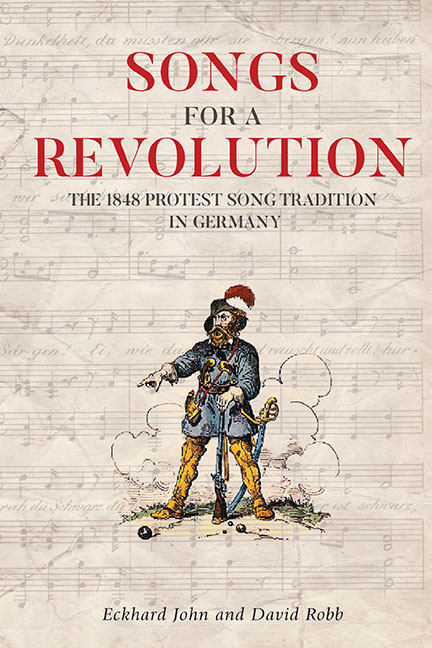Book contents
- Frontmatter
- Contents
- Preface
- Introduction: The Emergence of Political Song 1830–48
- Part I Before 1848: The Vormärz
- Part II 1848–49
- Part III 1848 in Memory
- Conclusion: The Making of Tradition; The Protest Songs of 1848 in the German Folk Revival 303
- Bibliography
- Discography
- Index of Names and Terms
- Index of Song Titles
16 - “Schlaf mein Kind, schlaf leis’” (“Badisches Wiegenlied”)
Published online by Cambridge University Press: 23 October 2020
- Frontmatter
- Contents
- Preface
- Introduction: The Emergence of Political Song 1830–48
- Part I Before 1848: The Vormärz
- Part II 1848–49
- Part III 1848 in Memory
- Conclusion: The Making of Tradition; The Protest Songs of 1848 in the German Folk Revival 303
- Bibliography
- Discography
- Index of Names and Terms
- Index of Song Titles
Summary
“SCHLAF MEIN KIND, SCHLAF LEIS’” (Sleep My Child, Sleep Softly), otherwise known as “Badisches Wiegenlied” (Baden Lullaby), is a text written by the politically engaged poet Ludwig Pfau in the final days of the Revolution in 1849. It was set to music shortly afterwards. In the following decades it disappeared from the public realm but left some traces in oral tradition up until the point when it was revived in the late 1960s. From this point on, it played a prominent role in the German folk scene, where it was performed by many singers and groups and set to various musical accompaniments.
The Stuttgart writer Ludwig Pfau (1821–94) first published “Badisches Wiegenlied” in December 1849 in the magazine Eulenspiegel, which he himself had founded. In the form of a nursery rhyme, the text takes a critical stance towards the Prussian troops who had suppressed the Baden revolution in July 1849 after a three-week-long siege of the Rastatt fortress, in which the remaining insurgents made their last stand. Even before his poem was issued in Stuttgart, Pfau had to flee to Switzerland because of his participation in the uprising. A little later his text was set to music by an unknown composer and published as a song with piano accompaniment, which circulated among the German refugees in Strasbourg. The print appeared with the dedication on the cover sheet: “Zum Besten deutscher politischer Flüchtlinge” (For the good of German political refugees).
The effect of Pfau's text is basically achieved by the sharp contrast between the innocent style of the lullaby and the bitter political content. At the beginning and end of each verse, the mother beseeches her child to sleep “leise” (quietly) and justifies this with reference to the Prussian troops “dort draußen” (outside), who are taking reprisals against revolutionaries. In the last verse, however, there is a twist, whereby the mother changes her appeal: when the day of freedom comes, the child should no longer sleep but rather scream out that revenge has been taken against the Prussians: “Schrei mein Kindlein, schrei’s: / Dort draussen liegt der Preuss” (Scream out my child, scream out: / The Prussian is lying out there).
- Type
- Chapter
- Information
- Songs for a RevolutionThe 1848 Protest Song Tradition in Germany, pp. 218 - 234Publisher: Boydell & BrewerPrint publication year: 2020

